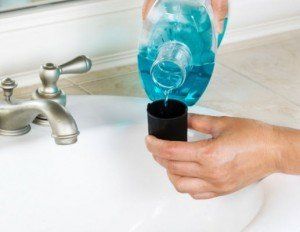What You Should Know About Choosing a Mouthwash
- By Dr. Sindy F.
- •
- 01 Jan, 2018

A quick stroll down the oral care aisle of your favorite supermarket, pharmacy, or warehouse store will reveal a mind-boggling array of mouthwash options. Name brands, store brands, a wide range of flavors, different claims on the label, and vastly differing price points can leave you dazed and confused. Rather than simply grabbing a bottle at random, follow this simple guide to choose the right mouthwash for you.
Why Use Mouthwash?
Mouthwash is another tool in your arsenal for promoting excellent oral health. While brushing and flossing remove the majority of food particles and bacteria, fighting dental plaque is an ongoing battle. Saliva helps to keep the harmful bacteria in your mouth to a minimum, especially if you are well-hydrated, but mouthwash gives your saliva an extra boost.
Depending on the formulation, it can freshen your breath, help fight dental plaque and gum disease, and even provide extra fluoride. While mouthwash is not strictly required for good oral health, it is a logical product to add to your routine.
Alcohol Considerations
Many parents prefer to keep alcohol-based mouthwashes away from their kids, while some recovering alcoholics do not want the temptation. In addition, some people with sensitive teeth or gums find the alcohol too harsh.
Fluoride Additives
Fluoride has long been known for its ability to help strengthen tooth enamel, but in children under 8 years of age, too much fluoride can cause a condition known as dental fluorosis, which damages the developing permanent teeth. Older kids and adults cannot develop dental fluorosis, as their permanent teeth are already formed, but many experts agree that the overuse of fluoride is not ideal for anyone.
If you already use fluoridated toothpaste and/or drink fluoridated water, it is usually best to skip the fluoridated mouthwash, especially if you have young children in your home. However, it is best to check with the dentist for guidance. For example, older kids and adults with severe dry mouth might benefit from the extra fluoride, as dry mouth tends to affect the bacterial levels in the mouth. A fluoride mouthwash can also be beneficial to patients with high risk of dental decay.
Plaque and Bacteria-Fighting Qualities
Mouthwash comes in two basic forms: cosmetic and therapeutic. Cosmetic mouthwashes are designed to freshen breath, but have little or no effect on dental bacteria or plaque. Therapeutic mouthwashes are designed to fight plaque and bacteria, but may not have much effect on breath.
As a general rule of thumb, if you are looking for something to use before a job interview or a date, choose a cosmetic mouthwash. If you need extra help with oral hygiene, select a therapeutic mouthwash instead. In fact, your dentist might prescribe a stronger therapeutic formulation, depending on your individual needs.
ADA Seal of Approval
Personal Preferences
Ultimately, like all personal care products, the right mouthwash is a highly individualized choice. Some people like strong products that leave a tingling sensation in the mouth. Others prefer a lighter formulation. Some people like certain flavors. Some are loyal to a particular manufacturer. Some are only interested in natural or organic formulations.
Check with your dentist to determine if your individual oral health calls for a certain type of mouthwash, and narrow down your options accordingly. Then, within those parameters, feel free to experiment. Some mouthwashes are better than others at specific tasks, but it would be tough to find a truly bad mouthwash that did not live up to at least one of its claims.*CLOSED FOR LUNCH
12:00 PM - 1:00 PM
916.786.6431
| HOURS OF | OPERATION |
|---|---|
| Monday | 8:00 am - 5:00 pm |
| Tuesday | 8:00 am - 5:00 pm |
| Wednesday | 8:00 am - 5:00 pm |
| Thursday | 8:00 am - 5:00 pm |
| Friday | APPOINTMENT ONLY |
| Saturday | CLOSED |
| Sunday | CLOSED |

OUR LOCATION
576 N. Sunrise Ave Suite 140 Roseville, CA 95661
Healthy Image Dental Group, Inc.
576 North Sunrise Avenue Suite 140
Roseville, CA 95661
Office (916) 786.6431
Email: healthyimagedentalgroup@gmail.com
Copyright ©2024 Healthy Image Dental Group, Inc. All Rights Reserved. Designed by Beautiful Site Designz
